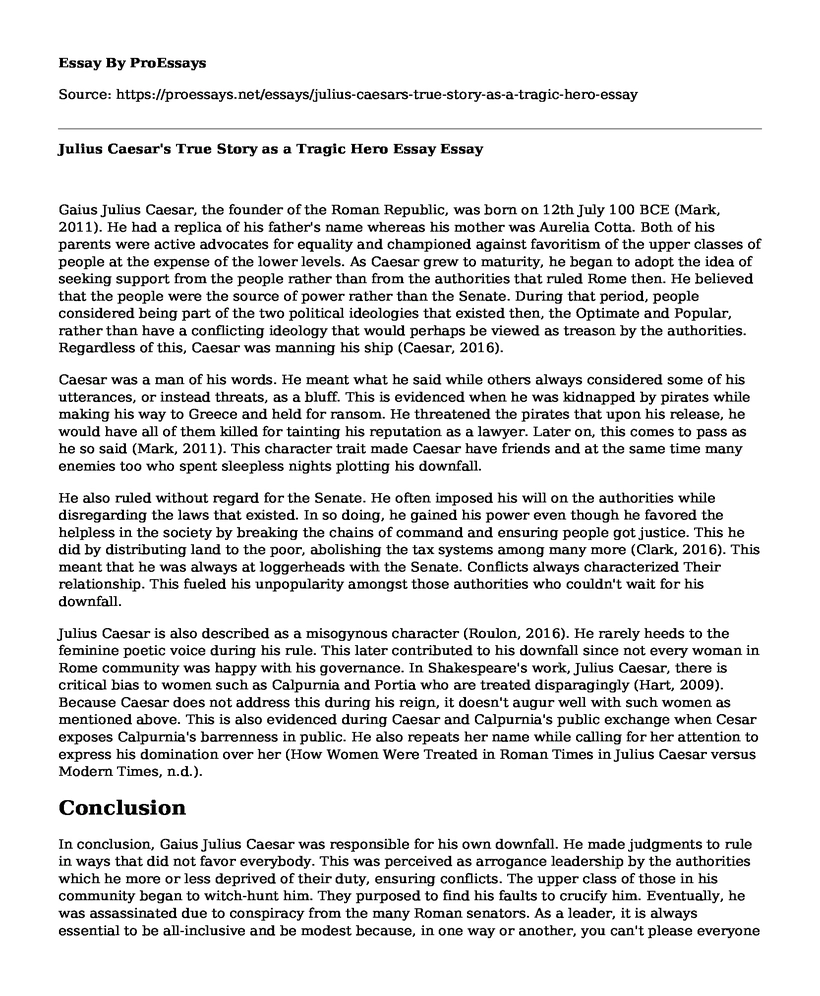Gaius Julius Caesar, the founder of the Roman Republic, was born on 12th July 100 BCE (Mark, 2011). He had a replica of his father's name whereas his mother was Aurelia Cotta. Both of his parents were active advocates for equality and championed against favoritism of the upper classes of people at the expense of the lower levels. As Caesar grew to maturity, he began to adopt the idea of seeking support from the people rather than from the authorities that ruled Rome then. He believed that the people were the source of power rather than the Senate. During that period, people considered being part of the two political ideologies that existed then, the Optimate and Popular, rather than have a conflicting ideology that would perhaps be viewed as treason by the authorities. Regardless of this, Caesar was manning his ship (Caesar, 2016).
Caesar was a man of his words. He meant what he said while others always considered some of his utterances, or instead threats, as a bluff. This is evidenced when he was kidnapped by pirates while making his way to Greece and held for ransom. He threatened the pirates that upon his release, he would have all of them killed for tainting his reputation as a lawyer. Later on, this comes to pass as he so said (Mark, 2011). This character trait made Caesar have friends and at the same time many enemies too who spent sleepless nights plotting his downfall.
He also ruled without regard for the Senate. He often imposed his will on the authorities while disregarding the laws that existed. In so doing, he gained his power even though he favored the helpless in the society by breaking the chains of command and ensuring people got justice. This he did by distributing land to the poor, abolishing the tax systems among many more (Clark, 2016). This meant that he was always at loggerheads with the Senate. Conflicts always characterized Their relationship. This fueled his unpopularity amongst those authorities who couldn't wait for his downfall.
Julius Caesar is also described as a misogynous character (Roulon, 2016). He rarely heeds to the feminine poetic voice during his rule. This later contributed to his downfall since not every woman in Rome community was happy with his governance. In Shakespeare's work, Julius Caesar, there is critical bias to women such as Calpurnia and Portia who are treated disparagingly (Hart, 2009). Because Caesar does not address this during his reign, it doesn't augur well with such women as mentioned above. This is also evidenced during Caesar and Calpurnia's public exchange when Cesar exposes Calpurnia's barrenness in public. He also repeats her name while calling for her attention to express his domination over her (How Women Were Treated in Roman Times in Julius Caesar versus Modern Times, n.d.).
Conclusion
In conclusion, Gaius Julius Caesar was responsible for his own downfall. He made judgments to rule in ways that did not favor everybody. This was perceived as arrogance leadership by the authorities which he more or less deprived of their duty, ensuring conflicts. The upper class of those in his community began to witch-hunt him. They purposed to find his faults to crucify him. Eventually, he was assassinated due to conspiracy from the many Roman senators. As a leader, it is always essential to be all-inclusive and be modest because, in one way or another, you can't please everyone though you have to convince the majority.
Refences
Caesar, J. (2016). CAESAR CIVIL WAR. LOEB CLASSICAL LIBRARY.
Clark, J. (2016, April 11th). What was Julius Caesar's relationship with the Senate from when he was born to his death/assassination and what are some excellent web resources and books I can use?
Hart, J. (2009). Introduction In Shakespeare. New York: Palgtrave Macmillan.
How Women Were Treated in Roman Times in Julius Caesar versus Modern Times. (n.d.). Retrieved from Barteby.com: https://www.bartleby.com/essay/How-Women-Were-Treated-in-Roman-Times-FKJUH9ZTC
Mark, J. J. (2011). Julius Caesar. Ancient History Encyclopedia.
Roulon, N. (2016). ACME. Retrieved from https://riviste.unimi.it/index.php/ACME/article/view/7414/7256
Cite this page
Julius Caesar's True Story as a Tragic Hero Essay. (2022, May 17). Retrieved from https://proessays.net/essays/julius-caesars-true-story-as-a-tragic-hero-essay
If you are the original author of this essay and no longer wish to have it published on the ProEssays website, please click below to request its removal:
- Leonardo da Vinci and Harper Lee Essay Example
- Biography of John F. Kennedy Paper Example
- Development of the Cold War - Essay Sample
- Essay Example on Aristotle: The Greatest Thinker & His Lasting Impact
- Research Paper on America's Journey: From George Washington to the Present Day
- Essay Example on 17th Century Atlantic Slave Trade: African Labor for the New World
- Up From Slavery: T. Washington's Autobiography of Transformation - Essay Sample







